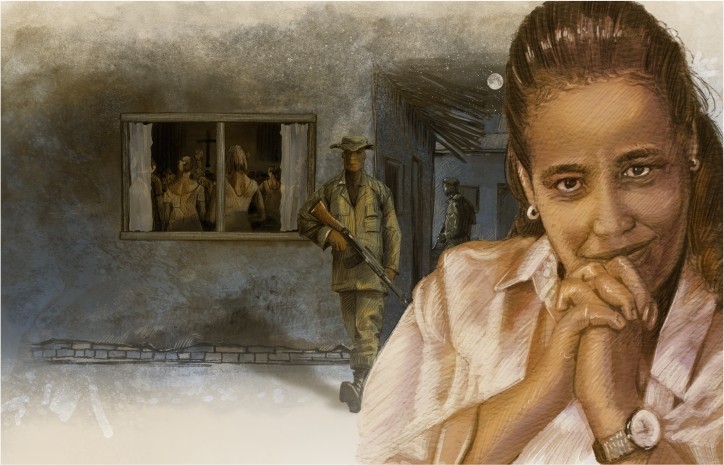In northeastern Nigeria, where Pastor Ishaku Manawa serves, death is never far away. “There are many people I know that Boko Haram has killed or kidnapped,” he said. “I cannot count the number of people I know that Boko Haram has killed.”
In 2014, the Islamic extremist group took control of parts of Nigeria, including the two largest cities in Adamawa state, where Ishaku works. Boko Haram militants have killed thousands of people and displaced millions of others in the region. The pastor said that in just one congregation, 37 members have been killed in Islamist attacks.
Today, the notorious extremist group operates mostly in remote, undeveloped areas. But its members continue to launch murderous attacks, and the region remains especially perilous for pastors like Ishaku.
“I cannot say that there is one thing I am most afraid of,” he said. “I know that even if they kill me, I will inherit the kingdom.” Although Ishaku has moved his family to an area where attacks are less frequent, he continues to minister to people fleeing Boko Haram attacks and often travels into potentially dangerous areas.
“My prayer is that if God still has work for me to do, He should keep me alive to do it,” he said. “God has always protected me from them, [though] I see [people connected to Boko Haram] every day.”
Ishaku has buried many Christians who were killed by Boko Haram, including two fathers and a pastor. One of the men had pursued the extremists after learning that his daughter had been kidnapped. “He chose to go after them,” Ishaku said, “but the terrorists laid ambush. They shot him and murdered him.”
The other father who was killed, a man named Ishaya, was kidnapped along with his young daughter. The Islamists ordered him to deny Christ, and when he refused, they killed him and then released his daughter.
The pastor they killed, known affectionately as Baba John, served in Borno state. “They attacked his community about four times and tried killing him,” Ishaku said, “but they failed.” The extremists weren’t finished trying, however. “One day, they came and told him that if he agreed to convert to Islam, they would spare his life,” Ishaku continued. “He said he would rather die; he would be happier if they killed him for the sake of Christ. His wife was there with him. They forced her to be a witness as they slaughtered him.”
Ishaku said that Boko Haram acts out of a sense of jihad (struggle), or holy war against the enemies of Islam, and many Islamists believe anyone who is not a Muslim should be killed.
For some jihadis, killing followers of Christ isn’t enough. They routinely mock the Christians they don’t kill. “The terrorists say things like, ‘Why are you running? Didn’t your Bible say you will be killed for the sake of Christ?’” Ishaku said. “They say these things, and we hear them all the time.”
Despite continual threats and the all-too-common killings, Ishaku carries on. He is committed to planting churches in this region because he sees God at work; he knows that fellowship among believers encourages those suffering from the ongoing attacks.
One way he encourages struggling congregations is by providing practical help. “We raised some money and built a shed … for the people to have a place of worship,” he said.
Those fleeing Boko Haram’s violent attacks often have nothing more than the clothes on their backs. “The people have been traumatised,” Ishaku said, “and so they have many problems. While I am solving one issue, another arises. The people need trauma healing. I do not have time to rest because there are so many problems to solve. The people do not have food to eat.”
Ishaku’s passion is to go where people are persecuted, even though he knows his life is in danger. “I enjoy working in areas of persecution,” he said. “I enjoy working with people who are suffering for the sake of Christ. I am not happy if I am enjoying [my life] and they are suffering.”
Grateful for the work God has given him of caring for those who have been driven from their homes, Ishaku asks for prayer, especially for other pastors serving in the region. “Pray that God will use persecution as a reason for us to do His work much more than before,” he said. “Pray that God will protect us.”
His church is caring for 200 pastors who are struggling to recover from trauma caused by severe persecution. “We pastors need prayers,” Ishaku said. “May God remove hatred for Muslims from the hearts of pastors, because you cannot pray for someone you hate. [The extremists] are people like us, and God can use anyone.” Pastor Ishaku’s wife supports his work to serve those who have suffered at the hands of Islamists, even though he spends weeks at a time in the bush. She tells him to go, and she and other members of the family pray for him while he is away.
Ishaku doesn’t own a motorcycle, and motorcycle taxis won’t go where he wants to travel, so he walks. “What excites me is going into interior communities to preach the Word of God, areas where Christians are not many,” he said. “Whenever I must walk many kilometres into the bush, to where I can find people with whom I can share the gospel, I am happy.”




Submit a Prayer